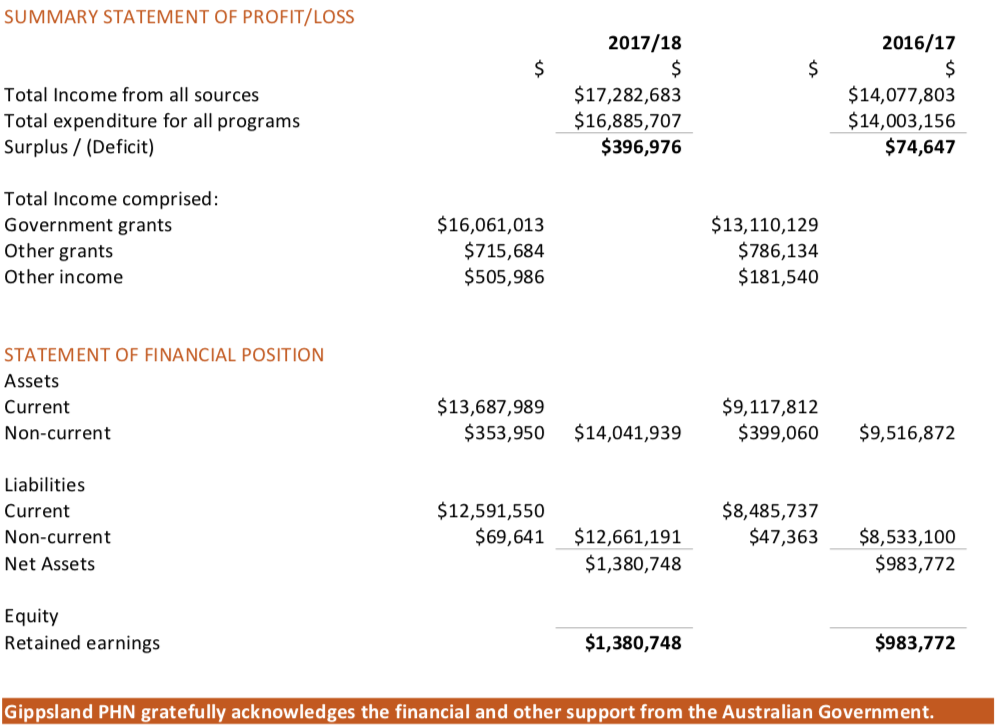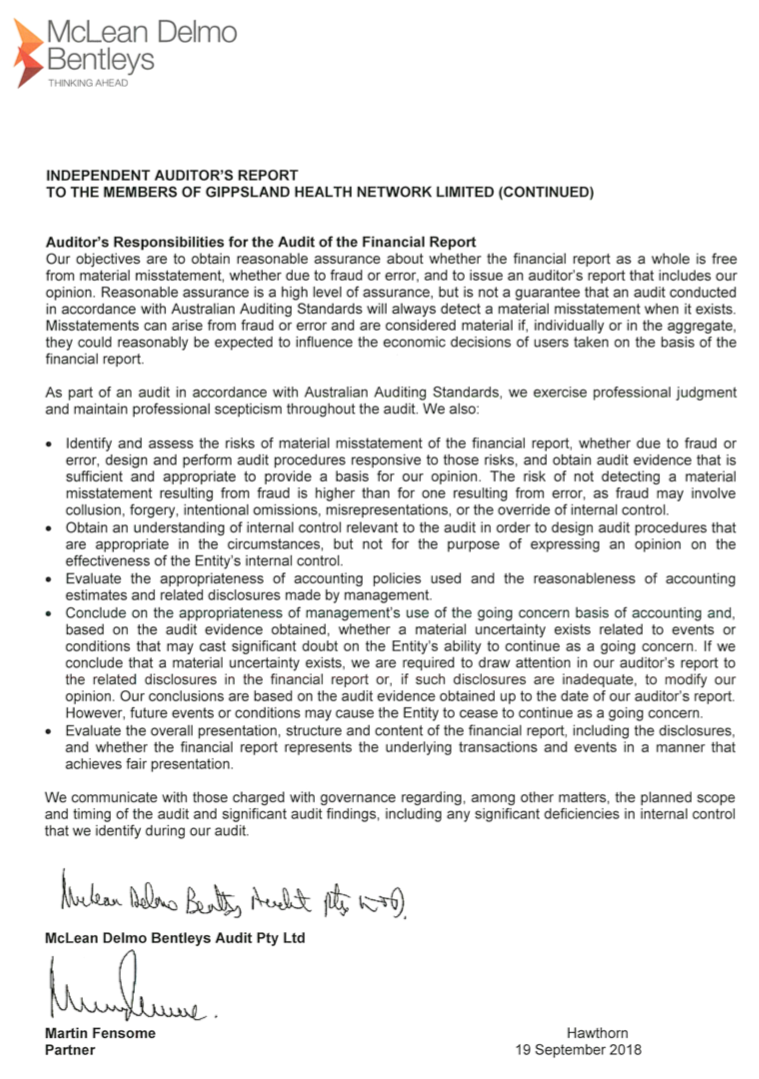Our Region, Gippsland
Gippsland encompasses the vast area from the Bunyip River in the west, Omeo in the north, Mallacoota to the east, to Wilsons Promontory and Phillip Island in the south. Gippsland includes six local government areas (LGAs): Bass Coast, Baw Baw, East Gippsland, Latrobe, South Gippsland and Wellington. At the 2016 Census the total population was 271,266.
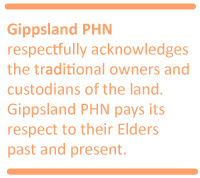
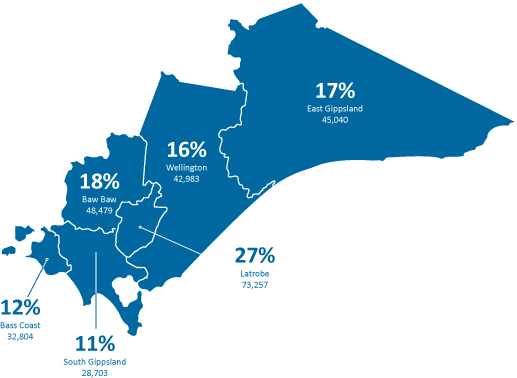
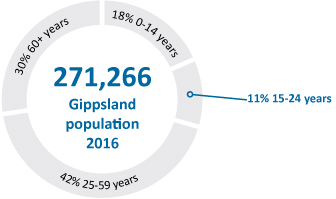
Board Chair’s Message – Dr Sinead de Gooyer
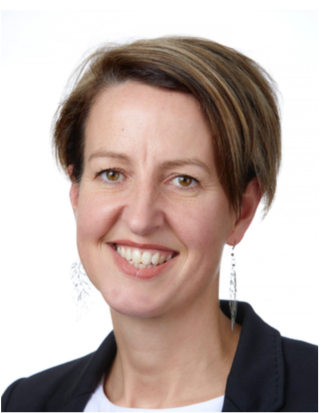
As the Chair of Gippsland Primary Health Network, I am proud to be part of an organisation that is committed to working together to unite the skills and expertise of our staff and health care providers to deliver high-quality and affordable healthcare.
I was particularly honoured to be elected back onto the Board at the Annual General Meeting (AGM) in 2017. This enabled me to be part of an organisation that continues to increase the efficiency and effectiveness of medical services for patients, particularly those at risk of poor health outcomes.
It’s been three years since the transition to Gippsland PHN and our journey to understand the health needs and priorities of our region continues. This supports our work to improve the health of our community by making it easier for patients to access health care services.
The role of our three sub-regional Clinical Councils in Gippsland and the Community Advisory Council has been fundamental to the services we invest in, ensuring they are relevant and clinically appropriate to improving primary health care for our Gippsland community.
This year we welcomed the signed Memorandum of Understanding (MoU) with the Secretary of the Victorian Department of Health and Human Services to formalise the commitment and over-arching framework for a collaborative working relationship with the six Victorian PHNs. This significant milestone reflects the shared focus on improving the efficacy of our health system and achieving better health outcomes. It also formalises a partnership that will facilitate integrated State and Australian Government initiatives for all Victorians.
In July 2018, our Chief Executive Officer (CEO) Marianne Shearer announced her resignation due to personal and family reasons, ending nearly a 30-year career in leading key health reforms and initiatives, supporting primary health care and driving improved whole of system health care.
As the inaugural CEO for Gippsland PHN, Marianne has made significant contributions to the establishment of a new approach to primary care service development in Gippsland.
On behalf of the Board, staff and management we sincerely thank Marianne for her exceptional hard work, dedication and expertise in leading the organisation through a period of significant change includ- ing the transformational move to a commissioning organisation.
I would also like to extend my thanks to the Board for their support over the past year, and to particularly acknowledge the contributions of Mr Jim Turcato, whose term finished at the AGM in 2017.
The Gippsland PHN staff must also be commended on their commitment to improving health outcomes for our region. This has been demonstrated through the significant work undertaken over the past 12 months.
This year I am pleased to present our annual report in a new web-based format as we celebrate our key achievements through four key themed areas – Innovation, Improved Access to Health Services and Cultural Appropriate Support for Indigenous and Other Diverse Communities.
I look forward to continuing to strengthen and build the work of Gippsland PHN in the year ahead.
Dr Sinead de Gooyer
Board Chair
Chief Executive Officer’s - Ms Marianne Shearer
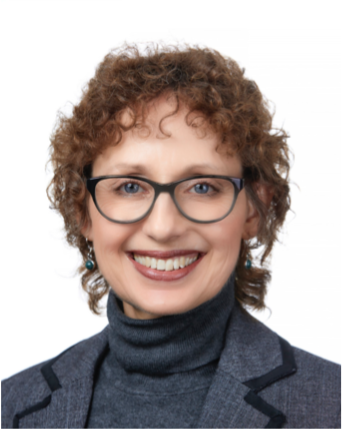
2017/18 was the year of growth for commissioned services delivered from PHN funding. Over the past year service access grew by 177 per cent from 17,061 occasions of service in 2016/17 to 47,179 services and episodes of care in 2017/18. Through a combination of guidelines and incentives, health providers were trained and supported to capture service access, integration of care and even in some programs improved health outcomes.
Our place-based approach continued this year as we focussed on increasing access to a range of primary and allied health services and activities for rural and remote communities. This approach enabled us to provide access to services in geographic locations where there
is evidence of high prevalence of chronic conditions, high-levels of socio-economic disadvantage and lower access to allied and other health services.
Our work with the Victorian Royal Flying Doctor Service is delivering psychological therapies into very remote communities using a combination of face to face and telehealth solutions. Commencing in East Gippsland, the service has attracted joint investment to reach into the coastal areas of Wellington such as Loch Sport and beyond.
Robust primary care data is an essential platform for population health planning and clinical decision making. The POLAR clinical support system is embedded in 57 general practices and has been upgraded to a full browser-based model with new decision support features. The system is a major stepping stone to enable general practices to adopt the upcoming Quality Improvement Practice Incentive Payments.
Other digital supports include the growth of HealthPathways. Commencing in early 2017 with 40 live pathways, Gippsland HealthPathways has grown to 159 pathways this year with 13 health services now signed up to support better integration and referral pathways between primary and secondary care.
My Health Record preparations have also been very active in the last 12 months, reaching 100 per cent of general practices and 92 per cent of community pharmacies across Gippsland.
Gippsland PHN were privileged to host the Australian Digital Health Agency media tour demonstrating hospital discharge summary up- loads and general practice and pharmacy readiness.
Comprehensive regionally based mental health planning commenced in consultation with providers to help implement and support a stepped care approach across Gippsland. Through this co-design, we were able to identify service gaps and refocus our primary mental health care programs to support a stepped care model with flexibility to increase and decrease the levels of care a person may need.
This approach is integral to the development of linkages with and between relevant services and supports, ensuring that the services provided are from a workforce that possesses the skills, qualifications and competencies commensurate with that intervention.
Gippsland PHN received its official accreditation this year, including an exceeded recognition for Community and Professional Capacity Building. This is a great result for the Gippsland PHN team and the first step towards building a more efficient organisation with increased capability.
In July 2018, it was with great regret that I announced my resignation due to personal and family reasons. It’s been an honour to have led the establishment of Gippsland PHN in 2015 and to be privy of its growth and success. The past three years have been a most fulfilling experience, a real privilege to get to know so much of Gippsland, to serve the Gippsland health providers and the community.
I have immensely enjoyed working with the health providers and community and clinical advisory committees and regret not being able to continue this journey working together to achieve a measurably healthier Gippsland.
I am confident great outcomes will continue underpinned by good governance and leadership, and our place-based structure.
I acknowledge the great work of the Board, Executive and Staff and look forward to seeing Gippsland PHN continuing to achieve much more beyond 2018.
Marianne Shearer
Chief Executive Officer
Our Strategic Direction
Gippsland Health Network, trading as Gippsland PHN, has rapidly matured in the primary health sector as a leading organisation and today plays a vital role at local, state and national levels.
Gippsland PHN’s strategic direction is defined in our vision, core functions (mission), objectives, principles, enablers, values and behaviours.
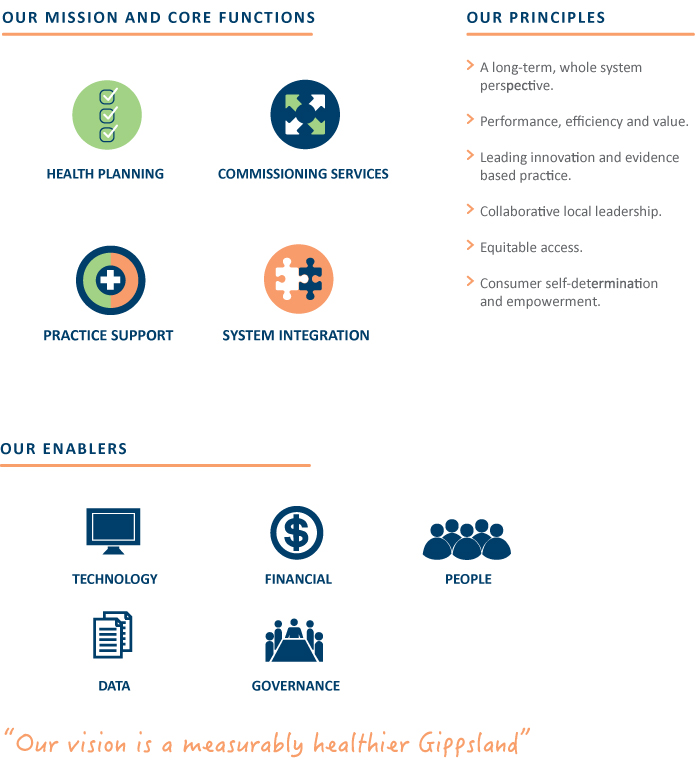
Our Health Priorities
Gippsland PHN’s vision is a measurably healthier Gippsland.
We aim to ensure our community gets the right care in the right place at the right time. After looking at data and talking to a lot of people, we have developed health priority areas where we will focus our work.




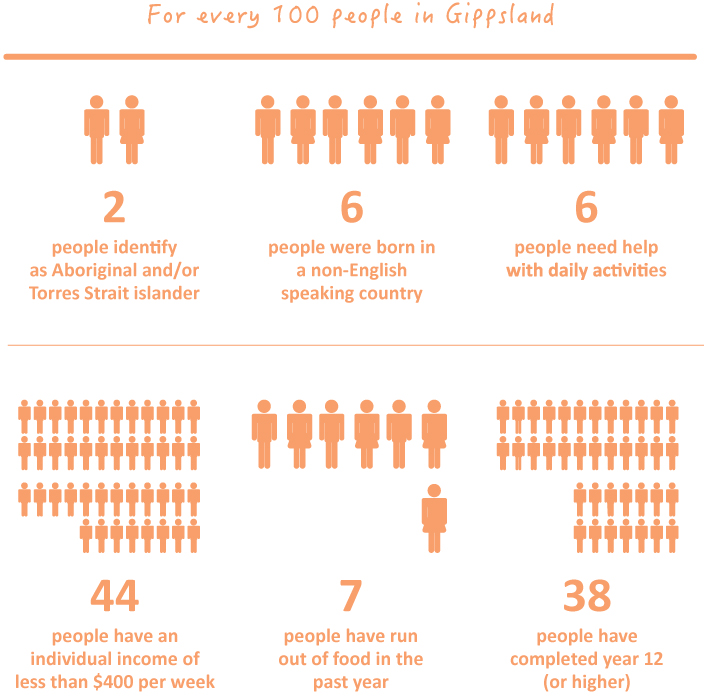
Our Values
Working together with our community, we are respectful and accountable, showing quality-focused and innovative approaches to achieve our vision of a measurably healthier Gippsland.

The Gippsland PHN Board of Directors
A Board of nine skills-based directors governs the strategic direction of Gippsland PHN, taking overall responsibly for:
- corporate governance
- setting the strategic direction and management goals
- reviewing all management plans and monitoring management performance against those plans in achieving the established goals
- ensuring compliance with all statutory responsibilities.
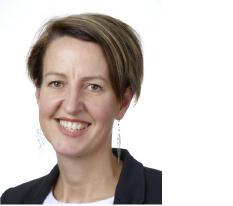
Sinead de Gooyer
Chair
Committees: CEO Performance and Remuneration Committee (Chair); Director Independent Selection and Remuneration Committee (December 2017—current).
Sinead is a general practitioner based in Inverloch where she has an interest in adolescent, women’s and mental health.
During her career Sinead has worked in rural and regional communities developing a strong commitment to improving access to primary health services within these communities.
Sinead is a graduate of the Australian Institute of Company Directors and is a board member of the Piano Project. Sinead brings her leadership, knowledge of the primary health sector and governance experience to her role as Chair.
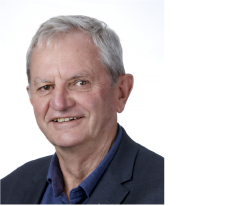
Duncan Malcolm
Deputy Chair
Committees: Audit, Risk and Finance Committee (Chair); CEO Performance and Remuneration Committee (July 2017—December 2017); Community Advisory Committee. Community Advisory Committee.
Duncan is a life-long resident of Gippsland and has served on many boards over the past 33 years, including the Gippsland Coastal Board, Gippsland Water, East Gippsland Shire Council (Commissioner), Lakes and Wilderness Tourism, the Monash University Gippsland Campus Advisory Council, and the Victorian Coastal Council. Duncan has been the chair of many organisations including the Victorian Environmental Assessment Council, the Rural Water Corporation of Victoria, the Irrigation Association of Australia, the Australian Irrigation Science Network, and he also holds current roles in the not-for-profit sector. Duncan is a strong consumer advocate and believes Gippsland people should have ready access to high standards of primary healthcare and associated services.
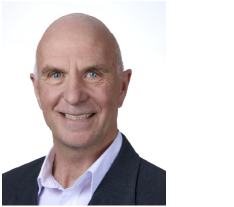
Mark Biggs
Committees: Clinical Governance Committee (July 2017—December 2017); Latrobe and Baw Baw Clinical Council, Audit, Risk and Finance Committee (December 2017—current).
Mark is the Principal at MBK Consulting and was a psychologist for more than 20 years in Gippsland. He has extensive senior management experience in the health and community services sector including disability, child protection, youth protection, vocational rehabilitation, and project and business management. He has expertise in strategic planning, policy, risk and business management. Mark is the Chair of Latrobe Community Health Service Ltd and previously served for nine years on the Board of Latrobe Regional Hospital, including as Deputy Chair and Audit and Credentialling Chair. Mark is skilled in the areas of clinical and corporate governance, quality assurance and compliance. Mark is committed to better health outcomes for people living and working in Gippsland.
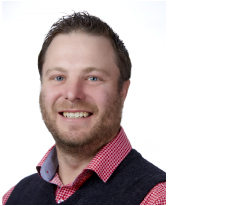
Murray Bruce
Committees: Audit, Risk and Finance Committee (July 2017—December 2017); Community Advisory Committee (July 2017–December 2017), Clinical Governance Committee (December 2017—current), Clinical Advisory Council (December 2017—current), Latrobe and Baw Baw Clinical Council.
Murray is a strong leader and an experienced commercial lawyer specialising in strategic planning, project management, risk management and governance. Murray has worked as a senior executive at the Department of Health and Human Services and also served as the Director of Australia’s largest-ever charitable appeal fund, the 2009 Australian Red Cross Bushfire Appeal Fund. He has successfully worked across all levels of government, many private and not-for-profit organisations and local community groups to deliver effective and efficient health services to communities. Murray is committed to helping improve the lives of people in Gippsland and their access to high-quality and efficient health services.

Nola Maxfield
Committees: Director Independent Selection and Remuneration Committee (Chair) (July 2017—December 2017); Clinical Governance Committee; Clinical Advisory Council (Chair); Bass Coast and South Gippsland Clinical Council.
Nola is a procedural general practitioner in a large teaching practice and has more than 20 years’ experience in a wide range of health-related organisations from local to national level. Based in Wonthaggi, Bass Coast, her involvement spans local, state and national bodies. Working closely with rural nursing, allied health and consumer groups, Nola continues to share her extensive and valuable knowledge of the issues facing a diverse region such as Gippsland within her various roles on the Board.
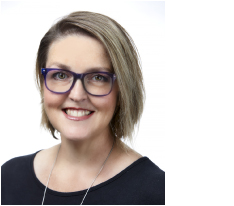
Kellie O’Callaghan
Committees: Director Independent Selection and Remuneration Committee (July 2017—December 2017), CEO Performance and Remuneration Committee (December 2017—current).
Kellie is recognised for her strong leadership in health, community services and governance. She is a well-respected community leader and influencer in Gippsland.
Kellie served for many years as the Chair of the Latrobe Regional Hospital Board and is a long—serving Latrobe City Councillor and former Mayor. She has served on a range of state boards and committees, including Better Care Victoria, where she is the Chair of the health innovation and service improvement focused state-wide Consumer Advisory Committee.
As the lead of O’Callaghan + Co, Kellie applies her significant experience as a board, strategy and governance consultant to assist organisations
and individuals to harness the great depth of opportunity that exists when you develop trusted, connected and genuinely engaged relationships with stakeholders and networks. She gets straight to the heart of real and very practical ways individuals, organisations and communities can overcome challenges and develop robust governance approaches while embedding strength-led co- design into their planning, service delivery and innovation programs.
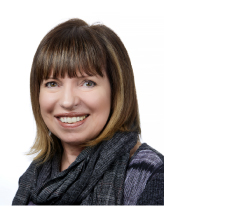
Ms Anne Peek
Committees: CEO Performance and Remuneration Committee; Community Advisory Committee (Chair).
Anne has served as a CEO and non-executive director in both the public and private healthcare sectors for more than 30 years. Anne is experienced in driving change and has a proven track record in building strong stakeholder relationships and developing partnerships through meaningful collaboration with the community. She has strong connections in the healthcare sector and at government levels. With a health science degree, Anne developed a passion and expertise in quality assurance in healthcare. This led to a successful consultancy in quality improvement/ clinical review during the 1980s and 1990s. Anne also lectured in management and health sciences at La Trobe University. She continues her strong interest in clinical governance and has assisted with the implementation of clinical governance frameworks within a number of organisations.
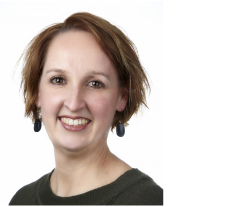
Ms Julie Rogalsky
Committees: Clinical Governance Committee (Chair); Wellington and East Gippsland Clinical Council, Clinical Advisory Committee.
As a Gippslander (born and educated in Latrobe Valley), Julie fully supports strong local primary healthcare, especially important to more marginalised populations and individuals experiencing disadvantage. Julie has more than 20 years’ experience in the Gippsland health sector having worked in the general practice, hospital, community health, government and GP training sectors. She has a Master of Health Services Management (Monash), Graduate Diploma in Rural Health (Monash) and a Bachelor of Applied Science – Health Promotion (Deakin). Julie is also a graduate of the Australian Institute of Company Directors and a graduate of Gippsland Community Leadership.
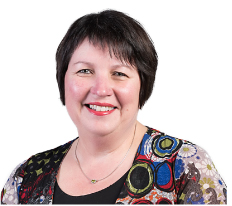
Ms Therese Tierney
Committees: Audit, Risk and Finance Committee (March 2018 – current).
Therese has had more than 40 years’ experience in the health sector in CEO and senior management roles since 1994. She has been a CEO in metro Melbourne and regional Victoria and in both the private and public health sectors. Her most recent role was Chief Executive Officer of Bairnsdale Regional Health Service. In that role she was appointed to both the Health Innovation Reform Council and the Victorian Expert Panel on Aboriginal Health. Her board roles include the Continence Foundation of Australia, East Gippsland Water Corporation and the East Gippsland Marketing Board.
While Therese has primarily worked in the health sector, she has also had significant involvement in local government as both a Councillor and General Manager and also worked as a consultant providing strategic and innovative solutions to challenges with business, change management, health planning and design, people and systems thinking.
The Gippsland PHN Executive Team
Taking direction from the Board, the Chief Executive Officer and her two Executive Managers lead a dynamic team in delivering on the organisational strategic direction.
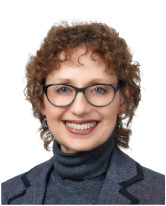
Ms Marianne Shearer
Chief Executive Officer
Committees: Audit, Risk and Finance Committee; Director Independent Selection and Remuneration Committee; Clinical Governance, Clinical Advisory Council; Three Sub—Regional Clinical Councils; Community Advisory Committee.
Marianne brings over 30 years of senior executive experience to Gippsland PHN. She has worked extensively with general practice and leading primary healthcare reform to respond to community needs, including managing health service workforce planning and general practice training programs in hospitals and practices.
Marianne is a Fellow of the Australian Institute of Company Directors and is a Board member of the Community College Gippsland and the Latrobe Health Assembly. She has qualifications in computing and data, a Master of Business Leadership and Graduate Certificate in Commercial Law.
Marianne’s strong cultural leadership and change management skills has guided the design of sustainable health solutions through successful partnerships involving local and diverse communities and numerous service providers. Marianne has led significant business growth and commissioned services to increase community access to care and improve population health.

Ms Amanda Proposch
Executive Manager, Operations
Committees: Clinical Governance Committee; Clinical Advisory Council; Community Advisory Committee; Executive Sponsor of three Clinical Councils.
Amanda is a healthcare management professional with extensive experience in practice management, private and public hospital nursing management, and healthcare redesign. She has contributed to the application of a process improvement methodology in the healthcare environment, coaching and developing high-performing teams, and elevating operational efficiency, productivity and consumer experience.
Amanda’s credentials include a Diploma of Applied Science (Nursing), Certificates in Practice Management and Lean Thinking, Master of Business Administration and Specialist Certificate in Executive Leadership.

Mr Robert Cherry
Executive Manager,
Corporate Services
Committees: Audit, Risk and Finance Committee.
Robert is a qualified accountant with more than 25 years’ experience in senior management roles in the private and public sectors. These include a public accounting practice as Principal and Director and General Manager of various not-for-profit, commercial and government organisations. The scope of these appointments has included responsibility for finance, taxation, governance, IT, human resources and community services portfolios. He has also served concurrently over the past 11 years in Defence with command responsibilities as an officer within the Australian Army.
His most recent role was as a Manager Finance and Administration with the Law Society of Western Australia in the Law Mutual Insurance division, based in Perth.
Robert has served as a Board member with Central Gippsland Health, Sale Elderly Citizens Village, National Trust (Gippsland Branch) and Sale Secondary College. Robert’s primary professional interests include effective governance and efficient organisational resource management.
Gippsland PHN Membership
Gippsland PHN’s membership comprises a broad range of individual and organisational members and has been stable during the 2017/18 year.
During the 2016 AGM, Gippsland PHN members approved an update of the constitution to recognise its charity status and strengthen its focus on community and primary healthcare. Since the 2017 transition, membership renewal has continued to grow steadily.
The updated constitution also triggered standard membership terms, which concluded all 140 members at the 2017 AGM. Encouraging membership renewal for the next three-year term, 54 members have been confirmed with more continuing to apply.
To be eligible for membership, an individual or organisation must engage in, or have a legitimate interest in, the provision of primary healthcare within Gippsland; for example, by being involved in the delivery, coordination, management, or capacity building of primary healthcare.
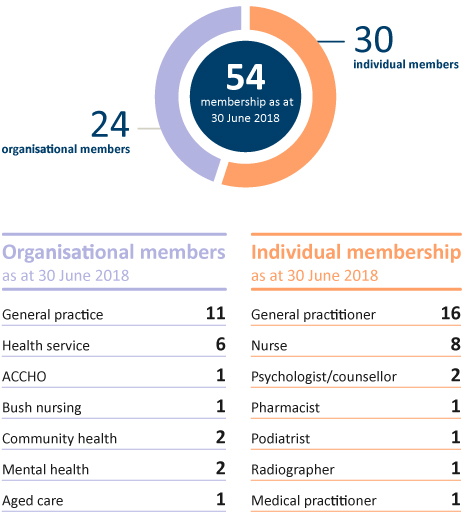
Engagement with Professional Stakeholders.
Our Stakeholder Engagement and Communication Governance Framework guides us as we involve our stakeholders in key decisions of the organisation when delivering on our core functions: health planning, system integration, commissioning and support to general practice and other health professionals.
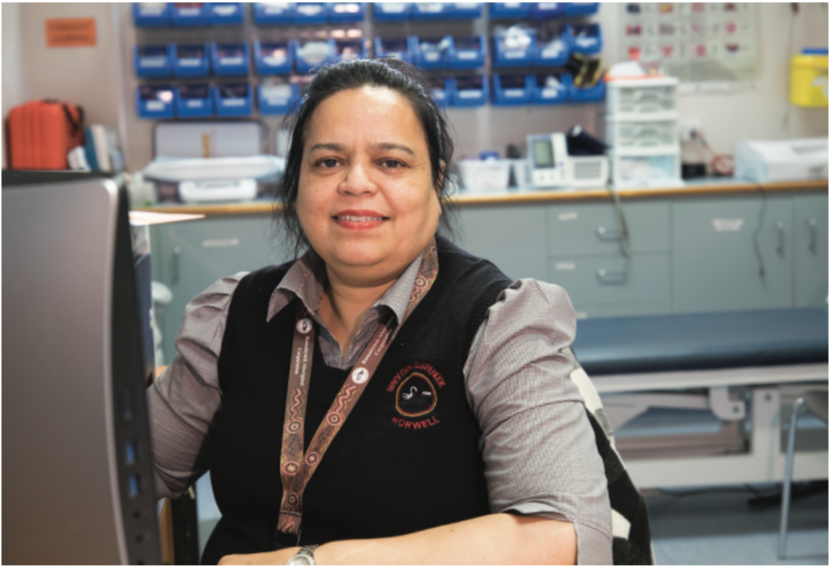
Our stakeholder interactions have increased by more than 150% since 2015/16.
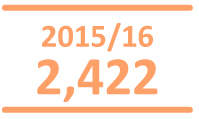
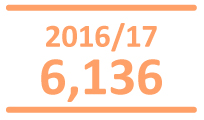

Our Advisory Structure
Gippsland PHN is registered with the Australian Charities and Not-for-profits Commission (ACNC). A key success factor for Gippsland PHN is the composition and governance arrangements of its advisory structures, including the Clinical Advisory Council, sub-regional Clinical Councils and the Community Advisory Committee complementing the four Board governance committees.

Sub-regional Clinical Councils
Gippsland PHN’s membership comprises a broad range of individual and organisational members.
- Support the community, GPs and other health professionals to be actively engaged in Gippsland PHN programs/projects.
- Be involved in activities associated with Gippsland PHN commissioning (advising on health needs, service design and evaluation).
- Support and advise on community and organisational health literacy.
- Participate in developing and promoting Gippsland HealthPathways designed to improve quality, streamline services and use resources effectively.
- Identify risks and opportunities for innovation and improvement in local, regional and national health priorities.
- Support and advise on building a sustainable workforce.
Bass Coast and South Gippsland Clinical Council
The Bass Coast region has a population of 32,804 and South Gippsland region has a population of 28,703 (2016). Like other Gippsland LGAs, they have a high proportion of people over the age of 60. There is a high satisfaction rate for facilities and services, with the rate of resident local volunteers being the highest in Gippsland and above the Victorian average.
Council members:
- Dr Trevor Andrews (GP), Chair, July - December 2017
- Dr Sue Comerford (GP), Chair, December 2017 to current
- Paul Greenhalgh (Nurse)
- Tania Findlay (Nurse)
- Anna Close-Mewett (Nurse)
- Gayle Bloch (Practice Manager)
- Francis Sullivan (Allied Health)
- Joanne Drury (Psychologist)
- Rhett McLennan (Aged Care)
- Alice Bradley (Practice Manager)
- Dr Mike Fitzgerald (GP)
- Carlene Hurst (Mental Health Nurse)
- Dr Nola Maxfield (Gippsland PHN Board)
Key achievements:
- Improving mental health pathways, professional relationships and the identification of local health system improvements.
- Working towards improving the way in which pain is managed in the local community.
- Improving access to services through innovative approaches to local transport.
- Raising awareness and preparing the region for the changes to the national standards for general practice accreditation.
Latrobe and Baw Baw Clinical Council
The Latrobe region has a population of 73,257 and the Baw Baw has a population of 48,479 (2016). People who live in these areas receive the highest median income in Gippsland; however, the Latrobe region has the highest unemployment rate. These regions have higher population density rates than other areas of Gippsland, and most people live close to public transport.
Council members:
- Dr Letitia Clark, (GP), Chair
- Ms Leanne Coupland (Allied Health)
- Dr Fred Edwards (GP)
- Ms Audra Fenton (Nurse)
- Mr Stuart Jillings (Dementia/Aged Care Nurse Practitioner)
- Ms Elizabeth Plunkett (Pharmacy)
- Ms Helen Rawlings (Mental Health)
- Dr Patrick Ruane (GP)
- Mr Murray Bruce (Gippsland PHN Board)
- Mr Mark Briggs (Gippsland PHN Board) July - December 2017
Key achievements:
- Improving the consumer and patient perspective into how commissioned services are evaluated.
- Increasing participation in the Gippsland PHN needs assessment process.
- Supporting research activities such as the GP Polar Diversion project (current stage is testing identification of patients likely to be hospitalised within the next 30 days). Preliminary research suggests this can be done with 70% accuracy.
- Supporting the Gippsland HealthPathways Program in both participation in the program and in recruitment of GP editors.
Wellington and East Gippsland Clinical Council
The Wellington region has a population of 42,983 and the East Gippsland region has a population of 45,040 (2016). These regions have the highest fertility rate in Gippsland, which is also higher than the Victorian average. The population density is low and about one-third of the population is aged over 60 years.
Council members:
- Dr Peter Stevens, Chair
- Dr Myles Chapman (GP)
- Mr Owen Connolly (Mental Health Nurse Practitioner)
- Ms Sharee Johnson (Psychologist)
- Dr Patrick Kinsella (GP)
- Ms Cassandra Mayman (Practice Manager)
- Mr Brendon Moar (Pharmacist)
- Ms Paula Morgan (ACCHO)
- Dr Andrew Roberts (GP)
- Dr Elisabeth Wearne (GP)
- Ms Julie Rogalsky (Gippsland PHN Board)
- Mr John Gibson (Dentist) July - August 2017
Key achievements:
- Working towards and advising on innovative health workforce solutions.
- Advance care planning research.
- Supporting the Gippsland HealthPathways Program in participation with the program, clinical working groups, and in recruitment of GP editors.
- Participation in mental health pathways development, including clinical editing.
- Facilitation and participation in mental health networking events.
Community Advisory Committee
Gippsland PHN’s Community Advisory Committee is at the centre of the organisation’s community engagement strategy. Members of the committee represent the geographic, cultural and population diversity of Gippsland.
- Ms Anne Peek, Chair
(Gippsland PHN Board) - Mr Duncan Malcolm
(Gippsland PHN Board) - Ms Patricia Bryce
- Ms Marion Byrne
- Ms Sue Gaffney
- Mr Michael Klein
- Ms Julie Hocking
- Ms Cheryl Drayton
- Ms Catriona Knothe
- Mr John Lawrence
- Ms Robyn Profitt
- Ms Jeanne Van Der Geest Dekker
High-level objectives:
- Provide input on sustainable opportunities to improve and integrate healthcare services for the patient or consumer.
- Engage with community networks to enable public participation.
- Provide direction and leadership in relation to the integration of consumer, carer and community views into all levels of Gippsland PHN operations, planning and policy development.
- Advocate to the Board on behalf of the community, consumers and carers.
- Advise on population health planning approaches and priorities for investment.
Key achievements:
- Improved the consumer and patient perspective into how commissioned services are evaluated.
- Increased participation in the Gippsland PHN needs assessment process.
- Latrobe Health Innovation Zone Smoking Cessation Project.
- My Aged Care Readiness Survey.
- Advanced care planning research.
- Referral System Analysis Project.
- Mental Health Outcomes Project.
Key measures of success:
- Access to services close to home.
- Information needed to navigate the health system is easily accessible and up-to-date.
- Health providers have all the information needed to meet the community’s health needs.
Our Organisation
Accreditation

Accreditation will support Gippsland PHN to:
- foster a culture of quality
- provide consumers with confidence
- build a better, more efficient organisation with quality and performance assurance
- increase capability
- reduce risk
- provide a competitive advantage over organisations that are not accredited,
- comply with regulatory requirements, where relevant.
Accreditation provides quality and performance assurance for owners, managers, staff, funding bodies and consumers. Accreditation is a tool to measure and improve performance and outcomes.

Staff and Board Awards Night
Our staff and Board awards night was held on 20 June 2018 at Century Inn in Traralgon. This event was an opportunity to reflect on our achievements and acknowledge the commitment of our staff, who continue to demonstrate our organisational values and behaviours through the work they deliver.
Community Centred:
Listening to viewpoints of local communities and focusing on local priorities
Award winner – Maria Garrett
![]()
Ethical and Respectful:
Honest, trustworthy and respectful of others, building supportive relationships
Award winner – Kashif Sheikh
![]()
Innovation:
Encouraging new ideas, creating opportunities, solutions and improvements
Award winner –
Latrobe Health Innovation
Zone Team Katie Foster, Phil Thompson, Megan Barnes, Daniel Webster, Denise Azar and Marg Bogart
Accountable:
Taking responsibility for actions and decisions, producing accurate, timely, high-quality work, and demonstrating persistence to achieve
Award winner – Corporate Services Team Debra Allen, Sarah Humphrey, Brendon Cox, Claire Smith, Dena Buxton and Merelyn Scharley
![]()
Focused on Quality:
Striving for excellence, extending knowledge, skills, experience and relationships
Equally shared by: Claire Smith, Jeannette Douglas, Nilay Kocaali
Five-year Service Awards
Congratulations to the following Gippsland PHN staff who received their five years of service award.
- Dena Buxton
- Sarah Humphrey
- Marg Bogart
- Elizabeth Craig
- Debra Le Cerf
Office Relocation
In June 2017, Gippsland PHN commenced preparations to relocate from 16 Kirk Street, Moe, to 11 Seymour Street in Traralgon.
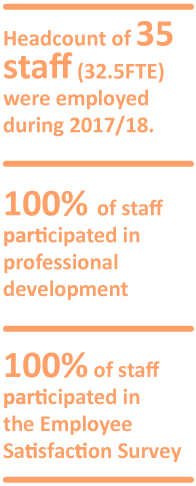
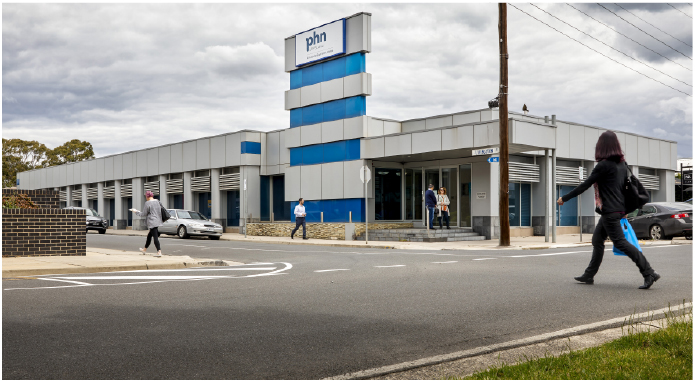
2018 Inaugural Gippsland Primary
Health Awards
In 2018, Gippsland PHN invited local individuals and health organisations to nominate individulas/organisations that have made a significant contribution to the health of the community and/or other health professionals.
These awards were represented through four priority areas to recognise: Innovation, Integration and Partnerships, Improved Access to Health Services, and Culturally Appropriate Support and Other Diverse Communities.
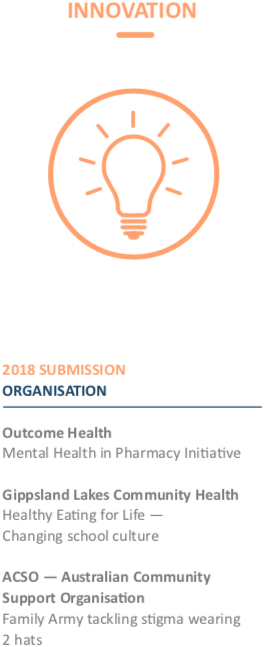


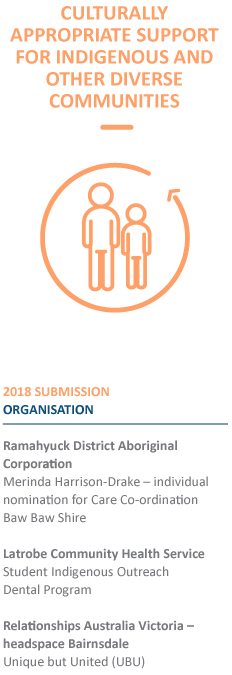
Gippsland PHN would like to thank everyone who submitted a nomination and congratulate our finalists.
Audit and Financials
Financial Report
The 2017/18 financial statements of Gippsland Health Network Limited were prepared by McLean Delmo Bentleys Audit Pty Ltd and were completed in accordance with the applicable Australian Accounting Standards, reduced Disclosure Requirements of the Australian Standards Accounting Board and the Australian Charities and Not-for-profit Commission Act 2012
Gippsland Health Network Limited utilises accrual accounting based on historical cost, modified where required.
